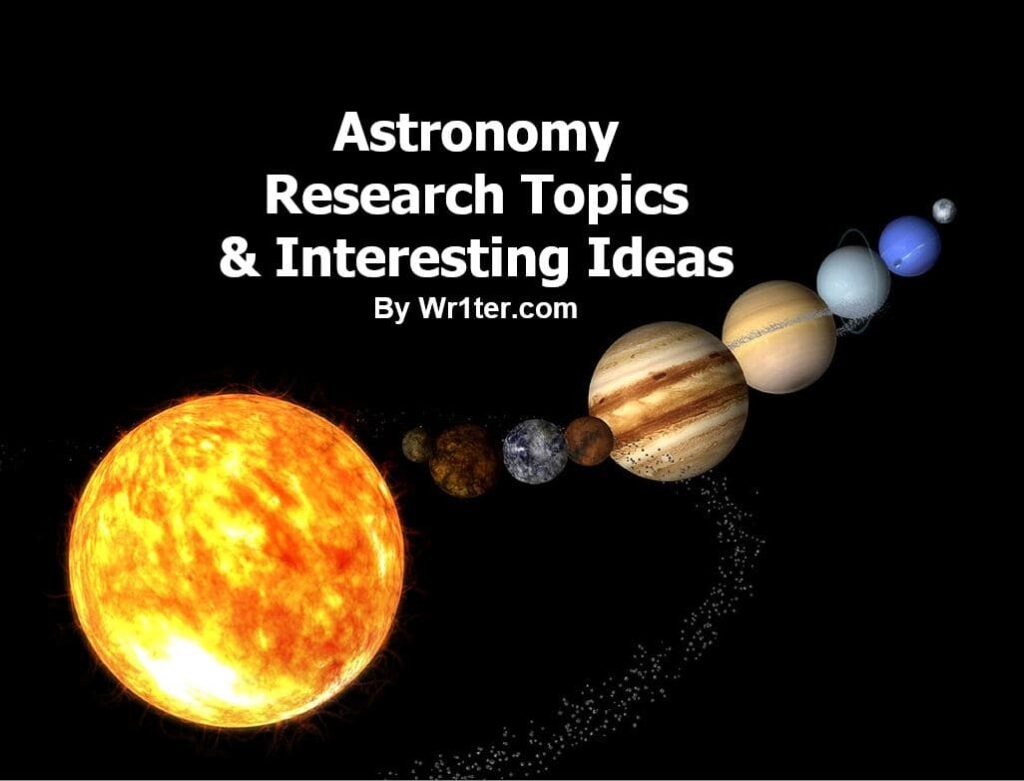Astronomy research topics encompass a wide range of fascinating themes. These topics include cosmic microwave background study to explore the universe’s origins and exoplanetary research to identify potentially habitable worlds. People can also investigate dark matter and energy investigations, which attempt to explain the unobservable 95% of the universe. They can study possible extraterrestrial life forms or examine star lifecycles and behaviors. Moreover, scientists can provide new insights into celestial collisions or learn about celestial bodies through radio frequency analysis. In turn, astronomy research topics continue to shape the human understanding of the cosmos, challenging perceptions and reshaping the existing knowledge of the universe.
What Is an Astronomy Research Paper Topic and Its Purpose
According to its definition, an astronomy research paper topic is a specific subject or question within a given field that guides a central focus of scholarly investigation and analysis. For example, the main purpose for selecting an astronomy research paper topic is to enable students to contribute to a scientific understanding of a cosmos by exploring unresolved questions or expanding on existing knowledge (Nartey, 2024). Basically, common astronomy ideas involve studies of celestial objects, phenomena, and the universe as a whole, relying on observational data, theoretical models, and technological advancements. Further on, by focusing on a well-defined astronomy topic, students can critically analyze relevant data, theories, and scientific literature, drawing connections and generating conclusions that advance an entire field (Everding & Keller, 2020). In principle, these astronomy subjects range from studies of planetary systems and stellar evolution to cosmology and astrophysical theories. Moreover, diverse themes foster a deeper engagement with a scientific community, encouraging collaboration, debate, and a refinement of astronomical knowledge (Bretones, 2019). Hence, astronomy research paper topics contribute meaningful insights that enhance a collective understanding of space, its origins, and its governing laws.

How to Choose
Choosing a good astronomy research paper topic requires a thoughtful and methodical approach, as it plays a critical role in an overall success of an entire study. For example, a first step is to assess one’s interests within a vast field of astronomy, such as planetary science, stellar evolution, cosmology, or astrophysics (Gullberg et al., 2023). In principle, students should select astronomy ideas that are both engaging and align with current trends or gaps in an existing literature. Further on, reviewing recent publications and scientific journals can help to identify areas that require further investigation or offer innovative insights (Knapen et al., 2022). As such, these astronomy themes should be specific enough to allow for an in-depth analysis and broad enough to provide sufficient resources for research. Moreover, a well-chosen astronomy subject must consider an availability of data and observational resources, ensuring that sufficient evidence exists to support rigorous inquiry (Cummings & Lanzerotti, 2024). Essentially, consulting with professors or experts in a given field can provide valuable guidance in refining a selected theme to ensure its relevance and feasibility. In turn, some steps for picking a good astronomy research paper topic include:
- Identify Your Area of Interest: Focus on specific branches of astronomy, such as cosmology, planetary science, or astrophysics, to find ideas you are passionate about.
- Review Recent Literature: Examine current research papers and journals to identify emerging trends or gaps in knowledge that offer opportunities for further investigation.
- Narrow Your Focus: Choose astronomy research paper themes that are specific enough to allow for detailed research but broad enough to find sufficient resources and data.
- Assess Data Availability: Ensure that reliable observational data or research tools are accessible to support your investigation.
- Consult Experts or Mentors: Seek advice from professors or professionals in astronomy to refine your astronomy research paper topic and ensure it is both relevant and feasible for your study.
Best Astronomy Research Paper Topics
- Evidence Supporting the Multiverse Theory
- Black Holes: Exploring their Role in Galaxy Formation
- Life Beyond Earth: A Scientific Search for Extraterrestrial Existence
- Analyzing Cosmic Microwave Background Radiation: Insights Into the Big Bang
- Terraforming Mars: Theoretical Approaches and Practical Limitations
- Stellar Evolution: Unraveling the Life Cycles of Stars
- Space-Time Warps: Understanding the Theory of General Relativity
- Venus’ Atmosphere: A Comprehensive Study on Its Composition and Climate
- Jupiter’s Moons: Potential Habitability and Life-Sustaining Conditions
- Dark Matter: Its Inferred Presence and Theoretical Implications
- Impacts of Solar Flares on Earth’s Electromagnetic Field
- Kepler Mission Findings: A Closer Look at Exoplanets
- Pulsars: Nature’s Precise Cosmic Clocks
- Probing Into the Enigma of Quasars
- Dark Energy: Its Role in the Accelerated Expansion of the Universe
- Astrobiology: Defining the Parameters of Life in the Universe
- Significance of the Hubble Constant in Cosmology
- Cosmochemistry: Understanding the Elemental Abundance in the Universe
- Gravitational Lensing: Exploring the Mass of the Universe
- Asteroids: Evaluating the Risk and Potential Resources
- Interstellar Medium: Understanding Its Role in Star Formation
Easy Astronomy Research Paper Topics
- Dwarf Galaxies: A Key to Understanding Galaxy Formation
- Unraveling the Mystery of Fast Radio Bursts
- Theories and Evidence of Cosmic Inflation
- Habitability of Titan: A Potential Cradle for Life
- Tidal Forces: Impact on Planetary Bodies and Their Moons
- White Dwarfs: Windows Into Stellar Death
- Magnetars: Examining the Strongest Magnetic Fields in the Universe
- Comets: Probes Into the Early Solar System
- Impacts of Space Weather on Satellite Operations
- Neutrinos: Ghost Particles of the Universe
- Exploring the Dynamics of Binary Star Systems
- Red Giants: Understanding the Late Stages of Stellar Evolution
- Cosmic Rays: Origin and Implications for Earth’s Atmosphere
- Gamma-Ray Bursts: The Universe’s Most Luminous Explosions
- Active Galactic Nuclei: Powerhouses of the Universe
- Cepheid Variables: Standard Candles in Distance Measurement
- Exoplanet Atmospheres: Hints of Alien Life
- Neutron Stars: Compact Objects with Extreme Conditions
- Oort Cloud: The Outermost Boundary of the Solar System
- Supernovae: Cataclysmic Endings of Stellar Lives
Interesting Astronomy Research Paper Topics
- Mercury’s Magnetic Field: Puzzling Aspects and Their Causes
- Radio Astronomy: Unveiling the Invisible Universe
- Spectroscopy: Decoding the Chemical Composition of Distant Stars
- Theories on the End of the Universe: Heat Death, Big Rip, or Something Else?
- Evolution of Galactic Structures in the Universe
- Roles of Dark Matter in Cosmic Structure Formation
- Enceladus: Investigating Potential Subsurface Life
- Interplay Between Cosmic Rays and Supernovae
- The James Webb Space Telescope: Anticipated Discoveries
- Theories on the Origin of the Moon
- Astrophysical Jets: High Energy Phenomena in the Universe
- Circumstellar Disks: Birthplaces of Planetary Systems
- Large Scale Structures in the Universe: Clusters and Superclusters
- Astronomical Impact on Earth’s Climate: A Long-Term View
- The Mystery of Ultra-High-Energy Cosmic Particles
- Supermassive Black Holes: Formation and Influence on Galaxy Evolution
- Quantum Gravity: Bridging the Gap Between Quantum Mechanics and General Relativity
- Investigation of Potential Life on Europa, Jupiter’s Ice Moon
- Kuiper Belt Objects: Probing the Edges of Our Solar System
- Merging Neutron Stars: Producers of Heavy Elements
- The Interplay of Gravitational Waves and Binary Black Holes
Academic Level Difference
Academic level differences in astronomy research paper topics reflect varying degrees of complexity, depth, and scope required at different stages of education. At an undergraduate level, common ideas in astronomy tend to focus on fundamental concepts and introductory exploration of celestial phenomena, such as studying a solar system, stellar classification, or key phases of the Moon (Nartey, 2024). Basically, these astronomy themes emphasize a foundational understanding and may involve reviewing existing literature or conducting simple observations. In contrast, graduate-level astronomy topics demand a more sophisticated approach, requiring original research, critical analysis, and engagement with advanced concepts, like dark matter, black hole physics, or exoplanet detection methods (Gullberg et al., 2023). As such, diverse astronomy subjects necessitate a particular use of specialized software, complex data analysis, and a deep engagement with recent scientific developments. At a Ph.D. level, astronomy research paper topics are highly specialized and involve groundbreaking work that aims to contribute new knowledge to a given field, such as investigating some implications of quantum gravity in cosmology or exploring an entire formation of supermassive black holes (Cummings & Lanzerotti, 2024). Therefore, originality, analytical rigor, and contribution to scientific discourse increase significantly with academic levels, underscoring an actual importance of selecting astronomy research paper topics that are both appropriate to a student’s expertise and contribute meaningfully to a field.
Astronomy Topics for High School
- Significance of Mars Colonization: A Comprehensive Study
- Investigating the Potential for Life on Jupiter’s Moon, Europa
- Pulsars: Lighthouses of the Universe
- Venus: The Hottest Planet’s Unique Atmosphere and Climate
- The Formation and Lifecycle of Stars
- Supermassive Black Holes: Engines of Galactic Centers
- Astrobiology: The Search for Extraterrestrial Life
- Comet Composition: Clues to the Early Solar System
- Harnessing Solar Energy: The Sun’s Role in Future Power
- Astrophotography: Capturing the Universe’s Stunning Phenomena
- Saturn’s Rings: Origin, Composition, and Evolution
- Dwarf Planets in the Solar System: An In-Depth Analysis
- Galactic Evolution: The Life and Death of Galaxies
- The Role of Telescopes in Shaping Modern Astronomy
- Supernova Explosions: Catastrophes that Shape the Universe
- The Impact of Space Debris on Earth’s Orbit
- Aurora Borealis: Unveiling the Northern Lights’ Secrets
- Exoplanets: The Hunt for Alien Worlds
- The Mystery of Fast Radio Bursts: A Cosmic Enigma
Astronomy Research Topics for College Students
- Origins of Galactic Structure: Unraveling the Formation of Spiral Galaxies
- Investigating Exoplanetary Systems: Analyzing Planetary Dynamics and Habitability
- Exploring Black Holes: Probing the Mysteries of Gravitational Singularities
- Unveiling the Secrets of Dark Matter: A Comprehensive Study on its Nature and Distribution
- Stellar Evolution: Tracing the Life Cycle of Stars From Birth to Death
- The Search for Extraterrestrial Intelligence: Examining Strategies and Technologies
- Analyzing Cosmic Microwave Background Radiation: Insights Into the Early Universe
- Solar Flares and Space Weather: Understanding the Impact on Earth and Astronauts
- The Great Attractor: Investigating the Mysterious Force Shaping the Local Universe
- Mapping the Large-Scale Structure of the Universe: Cosmological Surveys and Analysis
- Unraveling the Mystery of Fast Radio Bursts: Origins and Characteristics
- Interstellar Medium: Studying the Cosmic Material Between Stars and Its Influence
- Unveiling the Dark Energy: Constraints on its Nature and Implications for the Universe
- Stellar Archaeology: Examining Ancient Stars to Understand Galactic History
- Investigating the Kuiper Belt and Oort Cloud: Origins and Composition of Trans-Neptunian Objects
- Understanding Gamma-Ray Bursts: Probing the Most Energetic Explosions in the Cosmos
- Asteroid Mining: Assessing Feasibility and Implications for Future Space Exploration
- Proxima Centauri b: Analyzing the Exoplanet’s Potential for Habitability
- Galactic Collisions: Studying the Interactions and Mergers of Galaxies
- Quantum Cosmology: Examining the Role of Quantum Mechanics in the Early Universe
Astronomy Research Topics for University
- The Formation of Planetary Systems: Insights from Protoplanetary Disks
- Supernovae: Investigating the Explosive Deaths of Massive Stars
- Stellar Populations: Understanding the Diversity of Stars in Different Environments
- Space Telescopes: Advancements in Observation Techniques and Instrumentation
- The Transient Universe: Tracking and Analyzing Variable Celestial Objects
- Pulsars: Unraveling the Physics of Neutron Stars and Their Emissions
- Astrochemistry: Investigating the Chemical Processes in Space
- Cosmic Rays: Origins, Composition, and Effects on Astronomical Objects
- Exploring the Dynamics of Galactic Nuclei: Central Supermassive Black Holes
- The Role of Tidal Forces in Shaping Celestial Bodies: Tidal Interactions in the Solar System
- Galactic Archaeology: Tracing the Formation and Evolution of the Milky Way
- The Dark Side of the Moon: Unraveling Lunar Mysteries and Exploration Potential
- Supernova Remnants: Probing the Aftermath of Stellar Explosions
- Exoplanet Atmospheres: Characterizing Composition and Detecting Biosignatures
- Gravitational Waves: Detecting and Analyzing Ripples in Space-Time
- The Role of Magnetic Fields in Astrophysical Jets: Origin and Propagation
- Cosmic Inflation: Examining Early Universe Expansion and its Observational Consequences
- The Galactic Habitable Zone: Assessing Conditions for Life in the Milky Way
- Interplanetary Dust: Investigating Its Origin and Effects on Planetary Environments
- Solar System Dynamics: Orbital Evolution and Stability of Celestial Bodies
Astronomy Research Topics for Master’s and Ph.D.
- Examining the Role of Primordial Black Holes in Cosmic Inflation
- Theoretical Models of Gravitational Singularity Formation in Black Holes
- Exploring Quantum Gravity Theories Through Black Hole Thermodynamics
- Implications of the Multiverse Hypothesis for Cosmological Models
- Investigating the Nature of Dark Energy Using Quantum Field Theory
- Non-Gaussianities in the Cosmic Microwave Background and Their Origins
- Testing Modified Gravity Theories With Weak Gravitational Lensing
- Roles of Supersymmetry in Unifying Fundamental Forces in the Universe
- Effects of Tidal Forces on the Orbital Dynamics of Moons and Exoplanets
- Exploring the Holographic Principle in High-Energy Astrophysics
- Probing the Nature of Neutron Star Mergers With Gravitational Waves
- Investigating the Role of Axions in Dark Matter Composition
- Modeling the Large-Scale Structure of the Universe Using N-Body Simulations
- Impacts of Cosmic Strings on Early Universe Cosmology
- Studying the Topology of the Universe Through Cosmic Background Radiation
- Roles of Quark-Gluon Plasma in Early Universe Evolution
- Investigating the Anisotropies in the Cosmic Neutrino Background
- Supernovae as Probes for Dark Energy and Cosmic Acceleration
- Theoretical Insights Into Black Hole Information Paradox and Quantum Entanglement
- Probing Exotic Matter in Neutron Stars Through High-Energy Observations
Astrophysics Essay Topics & Ideas
- Unraveling the Mystery of Dark Matter in the Universe
- Black Holes: Engines of Destruction or Creation?
- Implications of Einstein’s Theory of Relativity in Modern Astrophysics
- Understanding the Phenomenon of Quantum Entanglement on the Cosmic Scale
- Exoplanets: Searching for Earth’s Twin in the Universe
- The Role of Supernovae in Galaxy Formation
- Are We Alone? The Search for Extraterrestrial Intelligence
- The Enigma of Fast Radio Bursts: Theories and Observations
- Exploring the Potential of Interstellar Travel
- Gravitational Waves: Echoes of Cosmic Events
- The Life and Death of Stars: Stellar Evolution
- Time Dilation in Space: A Closer Look at Special Relativity
- Examining the Impact of Solar Flares on Earth’s Magnetosphere
- Neutrinos: Ghost Particles of the Universe
- Cosmological Inflation: Exploring the First Seconds of the Universe
- The Expansion of the Universe: Beyond the Big Bang Theory
- Gamma-Ray Bursts: The Universe’s Most Luminous Explosions
- Multiverse Theory: Are We Just One of Many Universes?
- Mysteries of Dark Energy and the Accelerating Universe
- Roles of Cosmic Microwave Background in Understanding the Universe’s Origins
- Space-Time Curvature: Unveiling the Secrets of Gravity
Astronomy Research Topics About Modern Problems in the Study
- Unraveling Dark Matter: Investigations and Implications
- Cosmic Microwave Background Radiation: What Does It Tell Us?
- Gravitational Waves: Detecting Cosmic Collisions
- Terraforming Mars: Scientific Feasibility and Challenges
- Mitigating Space Debris: Solutions for the Crowded Skies
- Enceladus’ Potential for Life: Recent Discoveries and Future Exploration
- Identifying Rogue Planets: Implications for Cosmic Formation Theories
- Climate of Venus: A Cautionary Tale for Earth’s Future
- Asteroid Mining: Environmental and Ethical Considerations
- Quantum Entanglement: Its Role in Understanding the Universe
- Probing the Edge of the Universe: The Limits of Observational Technology
- Galaxies Far, Far Away: Observing the Early Universe
- Neutrino Astronomy: Challenges and Opportunities
- Exoplanets’ Atmospheres: Hunting for Signs of Life
- Space Tourism: Ethical Dilemmas and Sustainability Issues
- Cosmic Rays: Unveiling Their Mysterious Origins
- Evolution of Stars: Paradoxes and Puzzles
- String Theory and Multiverses: Scientific Speculation or Reality?
- Black Holes: Exploring Their Mysteries and Misconceptions
- Interstellar Travel: Evaluating the Technological Hurdles
- Harnessing Solar Power from Space: Opportunities and Challenges
- Magnetars and Pulsars: Decoding Their Bizarre Behaviors
Astronomy Research Paper Topics for Space Exploration
- Tracing the Evolution of Stars: From Protostars to Supernovas
- The Enigma of Dark Matter: Unraveling Universal Mysteries
- Mars Colonization: Feasibility, Challenges, and Potential Benefits
- Roles of Astronomy in Predicting Climate Change on Earth
- The Influence of Solar Flares on Earth’s Satellite Technology
- Significance of Exoplanets: Possibilities for Alien Life and Habitable Conditions
- Comets, Asteroids, and Meteoroids: Cosmic Debris and Their Impact on Earth
- Interstellar Travel: Concept, Technologies, and Prospects for the Future
- Unveiling the Secrets of Black Holes: Their Formation and Role in the Universe
- Cosmic Microwave Background: Evidence for the Big Bang Theory
- Investigating the Kuiper Belt: Pluto and Beyond
- Extraterrestrial Atmospheres: Comparative Planetology of the Solar System
- Pulsars and Quasars: Extreme Conditions in the Universe
- Gravitational Waves: Detecting Ripples in Space-Time
- Comet Chasing: Understanding the Composition and Life Cycle of Comets
- Hazards of Space Debris: Mitigating the Risks for Space Travel
- Harnessing Solar Power: The Future of Energy in Space
- Astronomical Spectroscopy: Decoding Light From Distant Stars
- Interplanetary Dust: Studying the Smallest Particles in Our Solar System
- Neutrinos From Space: Detecting Subatomic Particles From Beyond our Galaxy
- Exoplanet Hunting: Techniques and Discoveries
References
Bretones, P. S. (2019). Astronomy education research: Impact and future directions. EPJ Web of Conferences, 200, 1–11. https://doi.org/10.1051/epjconf/201920001022
Cummings, W. D., & Lanzerotti, L. J. (2024). Scientific debates in space science: Discoveries in the early space era. Springer.
Everding, D. J., & Keller, J. M. (2020). Survey of the academic use of planetariums for undergraduate education. Physical Review Physics Education Research, 16(2), 1–20. https://doi.org/10.1103/physrevphyseducres.16.020128
Gullberg, S. R., Robertson, P., & Orchiston, D. W. (2023). Essays on astronomical history and heritage a tribute to Wayne Orchiston on his 80th birthday. Springer.
Knapen, J. H., Chamba, N., & Black, D. (2022). How to write and develop your astronomy research paper. Nature Astronomy, 6(9), 1021–1026. https://doi.org/10.1038/s41550-022-01759-z
Nartey, J. N. (2024). Unveiling the cosmos: A beginner’s guide to the wonders of astronomy. Draft2digital.


